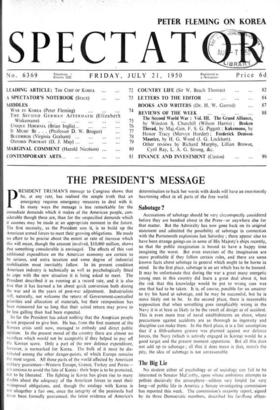THE PRESIDENT'S MESSAGE
pRESIDENT TRUMAN'S message to Congress shows that he, at any rate, has realised the simple truth that an emergency requires emergency measures to deal with it. In many ways the message is less remarkable for the immediate demands which it makes of the American people, con- siderable though these are, than for the unspecified demands which it assumes may be made at an appropriate moment in the future. The first necessity, as the President sees it, is to build up the American armed forces to meet their growing obligations. He made no effort to be precise about the extent or rate of increase which this will mean, though the amount involved, $10,000 million, shows that something considerable is envisaged. The effects of this vast additional expenditure on the American economy are certain to be serious, and extra taxation and some degree of industrial mobilisation must inevitably follow. In its present condition Artierican industry is technically as well as psychologically fitted to cope with the new situation it is being asked to meet. The President described it as running at a record rate, and it is also true that it has learned a lot about quick conversion both during the war and in the years of post-war adjustment. Industrialists will, naturally, not welcome the return of Government-controlled priorities and allocation of materials, but their reimposition has been rumoured for so long that their actual return may prove to be less galling than had been expected.
So far the President has asked nothing that the American people is not prepared to give him. He has, from the first moment of the Korean crisis until now, managed to embody and direct public opinion. In the present mood of the country there are almost no sacrifices which would not be acceptable if they helped to pay off the Korean score. Only a part of the new defence expenditure, however, is earmarked for Korea. The bulk of it must be dis- tributed among the other danger-points, of which Europe remains the most urgent. All those parts of the world affected by American military guarantees—Western Europe, Greece, Turkey and Persia— are anxious to avoid the fate of Korea: their hope is to be protected, not to be liberated. The fighting in Korea has given rise to many doubts about the adequacy of the American forces to meet their widespread obligations, and, though the analogy with Korea is not altogether a fair one, since the integrity of the peninsula had never been formally guaranteed, the latest evidence of America's determination to back her words with deeds will have an enormously heartening effect in all parts of the free world.


































